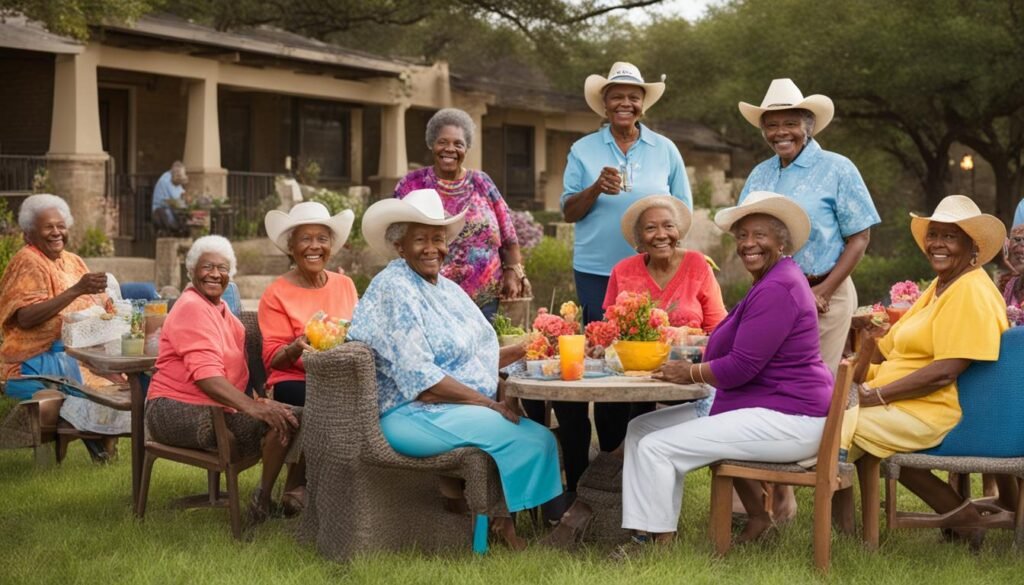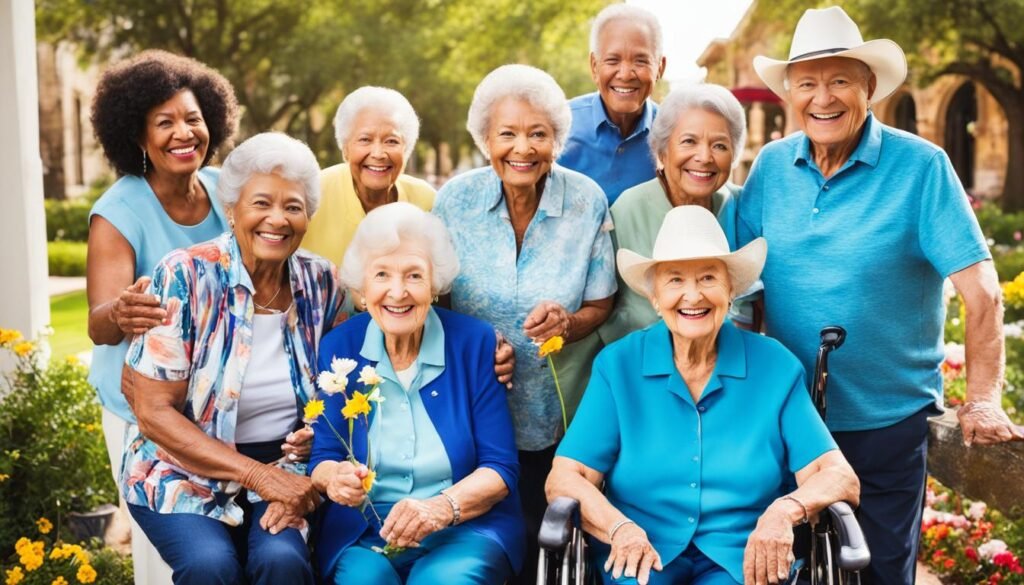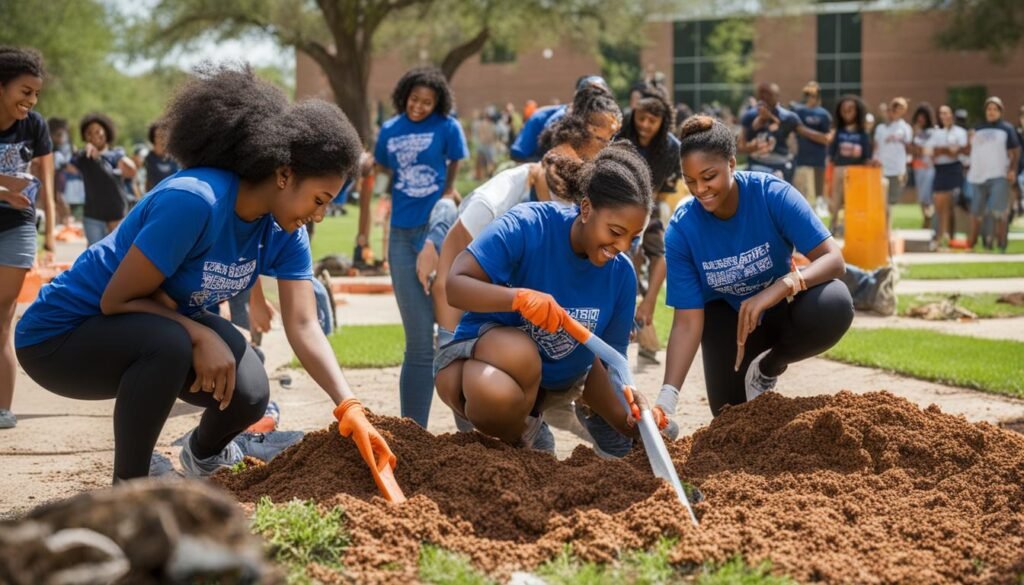When it comes to social life and community engagement, Texas offers a vibrant and diverse range of opportunities. From social clubs to community organizations, there are numerous ways for individuals to get involved and connect with others. Volunteer opportunities, local events, community initiatives, and cultural events are just a few examples of the exciting activities available to Texans.
Key Takeaways
- Texans have access to a wide array of social clubs and community organizations.
- Volunteer opportunities abound, allowing individuals to give back to their communities.
- Local events in Texas provide opportunities for socializing and networking.
- Community initiatives and development programs enrich the lives of residents.
- Cultural events showcase the diverse heritage and traditions of Texas.
Importance of Social Life and Community Engagement
Social engagement and community involvement play a crucial role in promoting overall health and wellbeing. When individuals actively participate in social activities and engage with their community, they experience several benefits that enhance their quality of life. Let’s explore the significance of social life and community engagement in creating a thriving and connected Texas.
Benefits of Social Engagement
Social engagement has a positive impact on various aspects of an individual’s health and wellbeing. People who actively participate in social activities are more likely to have better cognitive health and a reduced risk of cognitive decline. Additionally, they are more likely to stay current on health screenings, leading to early detection and prevention of health issues. Engaged individuals also experience greater mobility, which contributes to their physical fitness and overall independence.
Impact of Community Involvement
Communities that prioritize opportunities for engagement and involvement reap numerous benefits. Volunteer support from engaged residents allows community organizations to thrive and provide support to those in need. Engaged communities also experience increased community pride, as residents come together to work towards common goals and improve their neighborhoods. By fostering a strong sense of community involvement, Texas communities become vibrant and united.
Combating Loneliness and Isolation
Loneliness and isolation have detrimental effects on physical and mental health. By prioritizing social life and community engagement, individuals can combat these feelings and improve their overall wellbeing. Connecting with others and participating in community activities provides a sense of belonging and reduces the risk of social isolation. It creates opportunities for meaningful interactions and fosters a supportive network that promotes positive mental health.
Importance of Connection and Wellbeing
Staying socially connected is essential for overall wellbeing. Strong social connections contribute to increased happiness, reduced stress levels, and improved self-esteem. By engaging with their community, individuals develop a sense of purpose and fulfillment, leading to greater life satisfaction. Social life and community engagement are pillars of a healthy and fulfilling life, making it crucial to prioritize connection and wellbeing in Texas.
By recognizing the benefits of social engagement and community involvement, individuals can actively participate in activities that promote their own wellbeing and contribute to the growth and prosperity of their communities.
Next, we will explore different ways individuals can stay socially connected in Texas and further strengthen their community ties.
Ways to Stay Socially Connected
In today’s fast-paced world, staying socially connected is more important than ever. In Texas, there are numerous ways to cultivate strong social bonds and engage with your community. Here, we’ll explore several avenues that can help you remain connected and foster meaningful relationships with others.
Continual Learning
Continual learning through classes and educational programs is not only a great way to expand your knowledge but also provides a sense of accomplishment and helps build new skills. Whether it’s attending workshops, taking online courses, or joining local study groups, ongoing learning opens doors to new experiences and opportunities for connection.
Civic Engagement
Getting involved in civic engagement activities allows individuals to have a direct impact on public concerns, make a difference, and contribute to the betterment of their communities. Participating in local government initiatives, attending town hall meetings, and joining community organizations can empower you to address societal issues and connect with like-minded individuals who share your passion for positive change.
Exploration of Hobbies
Exploring hobbies not only provides an avenue for personal growth and self-expression but also presents opportunities to meet new people who share similar interests. Joining hobby-based clubs or participating in recreational activities like art classes, sports groups, or book clubs can lead to meaningful connections and lasting friendships.
Volunteerism
Volunteerism offers a way to give back to your community while forming new connections. Whether it’s helping out at local charities, participating in community service events, or joining volunteer organizations, lending your time and expertise not only benefits others but also allows you to meet like-minded individuals who are passionate about making a difference.
Connecting with Neighbors
Building strong relationships with your neighbors can be a significant source of social connection and community involvement. Initiatives like the “Know Your Neighbor” campaign promote neighborly interactions, reduce social isolation, and foster a sense of belonging. Taking the time to introduce yourself, organizing neighborhood events, or participating in community-building activities can help create a supportive and connected community.
Intergenerational Connection
Connecting across generations can bring unique perspectives and enrich our lives. Intergenerational programs provide opportunities for different age groups to interact, share experiences, and learn from one another. Whether it’s volunteering at local schools, participating in mentorship programs, or joining intergenerational community projects, these connections can contribute to personal growth, improve mental well-being, and strengthen the fabric of the community.
By actively embracing these various avenues for social connection in Texas, you can find fulfillment, create lasting relationships, and contribute to the vibrant fabric of your community.

Resources for Community Engagement in Texas
When it comes to community engagement, Texas offers a wealth of resources to help individuals connect, learn, and give back. From lifelong learning classes to civic engagement opportunities, here are some of the key resources available:
Lifelong Learning Classes
Universities, community colleges, local community centers, and libraries across Texas provide a diverse range of lifelong learning classes. These classes offer individuals the opportunity to continue their education, acquire new skills, and explore their interests.
Civic Engagement Opportunities
Texans can get involved in civic engagement at a policy level and make a difference in their communities. By participating in local government initiatives, volunteering for community organizations, and advocating for change, individuals can contribute to the development and betterment of their neighborhoods and cities.
Recreational Classes
Local senior centers in Texas often offer recreational classes and programs specifically designed for older adults. These classes provide opportunities for physical activity, creative expression, and social interaction, promoting overall well-being and a sense of community.
Volunteer Matching Platforms
For those interested in volunteering, there are several online platforms available to help individuals find the right volunteer opportunities. Platforms like Volunteer Match, Create the Good, and AmeriCorps Seniors connect volunteers with organizations in need, allowing them to contribute their time and skills to meaningful causes.
Know Your Neighbor Campaign
The “Know Your Neighbor” campaign encourages Texans to form connections with their older neighbors, promoting community involvement and reducing the risks of isolation. By fostering relationships and supporting one another, communities become stronger and more resilient.
Intergenerational Connection Resources
Intergenerational connection resources, provided by organizations like Ages United, facilitate meaningful interactions between younger generations and residents of long-term care facilities. These resources promote understanding, empathy, and companionship, creating valuable connections across age groups.
With these resources, Texans can easily engage with their communities, continue personal growth, and make a positive impact on society. Whether through learning, volunteering, or connecting with neighbors, community engagement in Texas offers endless opportunities for connection, personal development, and social change.
Aging Texas Well Initiative
The Texas Health and Human Services Commission’s Aging Texas Well initiative is a comprehensive effort aimed at preparing individuals, communities, and the state for all aspects of aging. This initiative focuses on enhancing scholarship, research, and creative activity related to aging, as well as improving curriculum and teaching to promote positive aging in Texas.
Aging Texas Well addresses various policy issues critical to aging well, including caregiving, education, employment, health and long-term care, recreation, social engagement, and volunteerism. By developing comprehensive strategies and fostering innovative solutions, the initiative strives to meet the evolving needs of Texas’ aging population.

“The Aging Texas Well initiative is committed to creating a future where our state’s elderly population can thrive. By addressing the diverse needs of older adults and promoting positive aging, we can build a resilient and inclusive Texas.”
The Aging Texas Well initiative recognizes the importance of community preparedness in supporting the elderly population. It aims to collaborate with local communities, organizations, and policymakers to implement effective strategies that prioritize the well-being of older adults and ensure their active participation in society.
Promoting Positive Aging
One of the key objectives of the Aging Texas Well initiative is to promote positive aging by fostering a supportive environment that values and empowers older adults. This involves challenging age-related stereotypes and encouraging the community to recognize the valuable contributions that senior citizens can make.
Comprehensive Strategies for Elderly Needs
The initiative focuses on developing comprehensive strategies to address the unique needs of the elderly population. These strategies encompass a wide range of areas, including healthcare, housing, transportation, social services, and accessibility. By taking a holistic approach, Aging Texas Well aims to create an inclusive and age-friendly Texas for all its residents.
Community Engagement and Policy Advocacy
The Aging Texas Well initiative emphasizes the importance of community engagement and policy advocacy. By actively involving older adults and their families in decision-making processes, the initiative promotes a sense of ownership and empowers individuals to voice their concerns and contribute to the development of policies that directly impact their lives.
Through the Aging Texas Well initiative, Texas is taking proactive steps to ensure that its aging population continues to lead fulfilling lives, supported by comprehensive strategies and community preparedness. By promoting positive aging and addressing the policy issues surrounding elderly needs, Texas is committed to creating a state where everyone can age well.
Aging Texas Well Strategic Plan
The Aging Texas Well Strategic Plan, mandated by Executive Order RP 42, serves as the state’s comprehensive master plan on aging. This plan identifies and addresses the various issue areas critical to aging well, with a focus on enhancing resources, services, and support for Texas’ older population.
Designed to guide state readiness and promote increased community preparedness for an aging Texas, the Aging Texas Well Strategic Plan is updated every two years with valuable input from the Aging Texas Well Advisory Committee.
By providing a comprehensive roadmap, this strategic plan aims to effectively identify aging needs and priorities, ensuring that Texas is well-prepared to meet the evolving requirements of its aging population. The comprehensive nature of the plan helps address the multi-faceted challenges associated with aging, covering areas such as healthcare, social services, and community programs.
Ultimately, the Aging Texas Well Strategic Plan acts as a master plan for aging, equipping the state and its communities with the tools and strategies necessary to address the needs of older Texans and promote positive aging.
Key Objectives of the Aging Texas Well Strategic Plan
- Identify and prioritize aging needs and priorities in Texas
- Guide state readiness and community preparedness for aging-related challenges
- Enhance resources, services, and support for Texas’ older population
- Address critical issue areas such as healthcare, social services, and community programs
Aging Texas Well Strategic Plan Highlights
| Objectives | Actions | Timeline |
|---|---|---|
| Conduct comprehensive assessment of aging needs | Engage stakeholders, collect data, and analyze aging-related challenges | Year 1 |
| Develop strategic initiatives | Create programs and services to address identified aging needs | Year 2 |
| Enhance community preparedness | Collaborate with local communities to develop aging-friendly policies and infrastructure | Year 3 |
| Evaluate and adjust the plan | Assess the effectiveness of implemented initiatives and update the plan accordingly | Ongoing |
Through the Aging Texas Well Strategic Plan, Texas demonstrates its commitment to addressing the diverse and evolving needs of its aging population. By planning strategically and proactively, the state can effectively enhance the quality of life for older Texans and ensure the well-being of its communities now and in the future.
Aging Texas Well Policy Briefs
Aging Texas Well policy briefs play a crucial role in promoting positive aging and addressing societal issues in Texas. These briefs provide valuable insights into what it means to age well and offer recommendations for fostering infrastructure development to support the needs of older adults.
Covering a wide range of topics, Aging Texas Well policy briefs delve into important areas such as:
- Abuse in later life
- Ageism
- Economic security
- Chronic conditions
- Mental health
- Transportation issues
Through these briefs, older adults and their loved ones can gain knowledge and access resources that cater to their unique needs. The information provided empowers individuals to make informed decisions about their well-being and connect with available services.
“Addressing the diverse challenges faced by older adults requires comprehensive strategies that foster infrastructure development. Aging Texas Well policy briefs contribute significantly to this endeavor, equipping community leaders and stakeholders in aging with the necessary insights to advocate for their older residents and lead policy discussions.”
Community leaders and stakeholders in aging are encouraged to utilize these briefs as valuable resources to promote positive aging within their communities. By incorporating the recommendations and insights from Aging Texas Well policy briefs, local organizations can develop effective strategies, policies, and programs that cater to the specific needs of older adults, ultimately benefiting the entire community.

Aging Texas Well Policy Briefs Overview
| Policy Brief Topic | Description |
|---|---|
| Abuse in later life | Examining the issue of abuse faced by older adults, including physical, emotional, and financial abuse. |
| Ageism | Exploring the societal stereotypes, prejudices, and discrimination faced by older adults. |
| Economic security | Analyzing the financial challenges and strategies for ensuring the economic well-being of older adults. |
| Chronic conditions | Addressing the management, prevention, and support systems for individuals with chronic health conditions. |
| Mental health | Highlighting the importance of mental well-being and strategies for promoting mental health among older adults. |
| Transportation issues | Examining the transportation challenges faced by older adults and exploring solutions to improve their mobility and access to essential services. |
These policy briefs serve as valuable resources in guiding policy discussions and shaping strategies aimed at fostering positive aging in Texas. By addressing key issues and supporting infrastructure development, Aging Texas Well policy briefs pave the way for a society that values and supports the well-being of its older population.
Community Engagement at Sam Houston State University
Sam Houston State University believes in the power of community engagement and recognizes it as a collaborative effort between the institution and the larger community. This collaboration fosters the exchange of knowledge, resources, and ideas for the betterment of both.
In pursuit of this commitment, Sam Houston State University actively seeks partnerships with the public and private sectors. These collaborations serve to enrich scholarship, research, and creative activities within the university, while also enhancing the curriculum and teaching methods. By partnering with external entities, the university aims to prepare educated and engaged citizens who are well-equipped to contribute to society.
As a proponent of community-engaged scholarship, Sam Houston State University emphasizes the importance of addressing community-based problems and involving community partners in decision-making processes. This approach fosters reciprocity and ensures that knowledge is co-produced in collaboration with the communities being served.
Through the exchange of ideas, knowledge, and expertise, Sam Houston State University is dedicated to implementing findings that result from community-engaged scholarship. By leveraging the strengths and resources of both the university and the community, the goal is to create meaningful and impactful changes that contribute to the public good.
Community engagement at Sam Houston State University exemplifies the power of collaboration, partnership, and knowledge exchange between academic institutions and the public and private sectors. By working together, we can make a lasting difference in our communities and foster positive change.

Conclusion
Social life and community engagement play a vital role in Texas, fostering vibrant community initiatives and nurturing connections among residents. By actively participating in social activities, volunteering, and engaging in community organizations, individuals have the opportunity to contribute to their community and make a positive impact on the lives of others. Prioritizing social connections and community involvement not only enhances the overall well-being and sense of belonging of individuals in Texas, but also strengthens and enriches the entire community.
By actively participating in social life and community engagement, Texans have the power to create thriving communities that embody unity, diversity, and inclusivity. Embracing social connections and community involvement allows for the creation of stronger bonds among residents, resulting in a sense of shared purpose and pride. Through these meaningful interactions, vibrant community initiatives are born, fostering collaboration, compassion, and cultural enrichment.
Engaging in social life and community initiatives in Texas goes beyond personal fulfillment – it impacts the quality of life for all residents. By fostering connections and building relationships through social activities, volunteering, and community organizations, Texans contribute to the overall well-being and prosperity of their neighborhoods and cities. The commitment to social engagement and community involvement in Texas exemplifies the state’s dedication to creating a supportive and vibrant environment for all its residents, and serves as a testament to the power of unity and collaboration in enriching communities.








